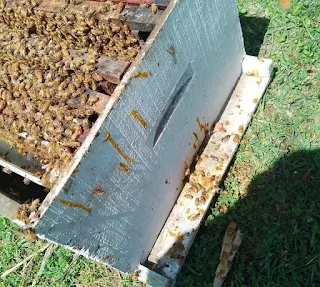Introduction:
Beekeeping is a rewarding endeavor, but it comes with its share of challenges, one of which is ensuring the health and well-being of your bee colonies. Two common issues that beekeepers often encounter are Nosema and diarrhea. In this blog post, we'll delve into what Nosema is, how it affects bees, and practical steps beekeepers can take to mitigate its impact. We'll also touch on diarrhea, another prevalent issue that can affect bee colonies, and explore its causes and remedies.
Symptoms of Nosema:
- Reduced foraging activity
- Increased mortality rates
- Reduced honey production
- Dysentery (diarrhea)
Impact of Nosema on Bee Colonies: Nosema weakens the immune system of bees, making them more susceptible to other diseases and environmental stressors. If left untreated, Nosema can lead to the collapse of the entire colony, posing a significant threat to bee populations and agricultural ecosystems.
Prevention and Treatment of Nosema:
- Hygiene: Maintain clean and well-ventilated hive conditions to minimize the spread of Nosema spores.
- Nutrition: Ensure that bees have access to a diverse and nutritious diet, including pollen substitutes if necessary, to support their immune systems.
- Medication: Consult with a veterinarian or experienced beekeeper to determine appropriate treatment options, such as administering fumagillin or other anti-Nosema medications.
Causes of Nosema
Nosema can be caused by various factors, including poor nutrition, environmental stressors, and exposure to contaminated food or water sources. The use of certain pesticides can also contribute to Nosema outbreaks in bee colonies.
What is Diarrhoea in Bees?
Diarrhoea, often mistaken for Nosema, is a condition where bees exhibit increased defecation outside the hive. This can be a symptom of various issues, including Nosema, poor diet, or environmental factors.
Symptoms of Diarrhoea
- Increased defecation outside the hive
- Watery or discolored fecal matter
- Weakened or disoriented bees
Causes of Diarrhoea
Diarrhoea in bees can be caused by similar factors to Nosema, including poor nutrition, exposure to toxins, or other stressors. It's essential to identify the underlying cause to effectively treat the condition.
Treatment and Prevention
- Good Nutrition: Providing bees with a diverse and nutritious diet can help boost their immune systems and reduce the risk of disease.
- Hygiene: Maintaining clean hives and regularly cleaning hive equipment can help prevent the spread of Nosema and other diseases.
- Reducing Stress: Minimizing stressors such as overcrowding, extreme temperatures, and pesticide exposure can help keep bee colonies healthy.
- Medication: In severe cases, beekeepers may use medications specifically designed to treat Nosema. However, this should be done under the guidance of a veterinarian or experienced beekeeper.
Final Words
Nosema and diarrhoea are serious issues that can affect bee colonies, potentially leading to significant losses if not addressed. By understanding the causes and symptoms of these conditions, beekeepers can take proactive measures to protect their hives. Providing bees with a healthy environment, good nutrition, and prompt treatment when needed can help ensure the well-being of these vital pollinators.

